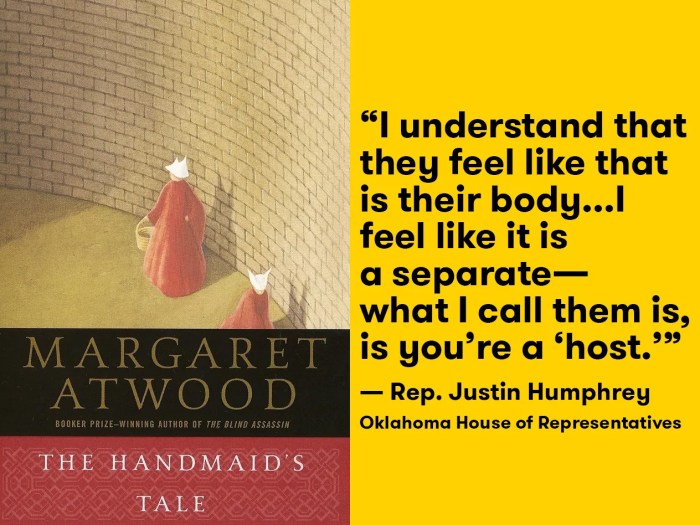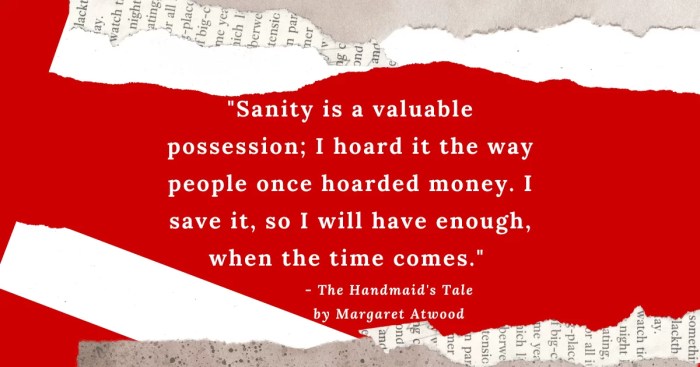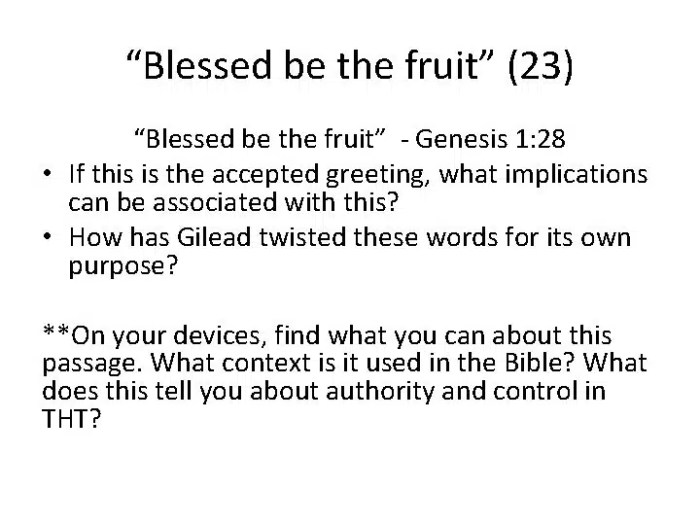Quotes from The Handmaid’s Tale with Page Numbers: A Journey into a Dystopian Society’s Complexity
Margaret Atwood’s The Handmaid’s Tale is a thought-provoking novel that explores the complexities of a dystopian society through the eyes of its protagonist, Offred. This collection of quotes from the novel, with their accompanying page numbers, provides a deeper understanding of the society’s oppressive nature, the characters’ struggles, and the themes that Atwood explores.
Prominent Quotes from “The Handmaid’s Tale”

Margaret Atwood’s “The Handmaid’s Tale” features powerful and memorable quotes that provide insight into the dystopian society depicted. These quotes highlight the themes of oppression, resistance, and the struggle for autonomy.
Significance of “We were the people who were not in the papers. We lived in the blank white spaces at the edges of print. It gave us more freedom.” (p. 11)
This quote emphasizes the marginalization and erasure of individuals in the society of Gilead. The “blank white spaces” represent the absence of recognition and voice for those who do not conform to the strict rules and expectations. However, this lack of visibility also allows for a certain degree of freedom and resistance.
Examples of Other Powerful Quotes
- “And so I will begin by telling you the story of my life, which you will not find in any history book written by men.” (p. 10)
- “We were the ones who did not make it. We were the ones who were killed in the war, the ones who died in the camps, the ones who were shot in the streets.” (p. 167)
- “Hope is the first step on the road to disappointment.” (p. 182)
Symbolism in the Quotes
“My body is a cage” (p. 33)
This quote symbolizes the physical and psychological imprisonment of women in Gilead. The handmaids’ bodies are controlled and used as vessels for reproduction, denying them autonomy and freedom.
“There is more than one kind of freedom, Offred. There is freedom to and there is freedom from.” (p. 108)
This quote explores the complexities of choice and resistance. It suggests that true freedom involves not only the ability to do what one wants but also the freedom from oppression and constraints.
Impact on the Reader’s Perspective
“We are not the ones who are dying here. We are the ones who are being killed.” (p. 167), Quotes from the handmaid’s tale with page numbers
This quote challenges the reader’s perception of victimhood and responsibility. It implies that those who are oppressed are not solely responsible for their suffering, but rather victims of a larger system of violence and injustice.
“It’s not just the Commander and Serena. It’s everyone who believes in Gilead.” (p. 248)
This quote broadens the reader’s understanding of the society’s complicity. It suggests that the oppressive regime of Gilead is not sustained solely by a few powerful individuals but by the collective beliefs and actions of its citizens.
Literary Techniques in the Quotes

“The snow is falling on the roof like a thousand tiny hammers” (p. 51)
This quote uses vivid imagery to create a sensory experience for the reader. The sound of the snow falling is likened to hammers, evoking a sense of oppression and relentless force.
“Remember”
The repeated use of the word “remember” throughout the novel emphasizes the importance of memory and resistance. It encourages the reader to remember the past and to hold onto hope for a better future.
Themes Explored in the Quotes

“I will not be a victim.” (p. 103)
This quote reflects the theme of resistance and the characters’ determination to overcome oppression. Despite the hardships they face, they refuse to accept their fate as victims.
“Hope is the first step on the road to disappointment.” (p. 182)
This quote explores the dangers and complexities of hope. It suggests that while hope can provide solace and motivation, it can also lead to disillusionment if not tempered with realism.
Top FAQs: Quotes From The Handmaid’s Tale With Page Numbers
What is the significance of the quote “We were the people who were not in the papers. We lived in the blank white spaces at the edges of print. It gave us more freedom.” (p. 11)?
This quote highlights the marginalized existence of women in the dystopian society of Gilead. By being excluded from the official narrative, they gain a certain degree of anonymity and autonomy, allowing them to resist the regime’s oppressive control.
How does the quote “My body is a cage” (p. 33) symbolize the protagonist’s struggle for autonomy?
This quote reflects Offred’s sense of confinement and objectification within Gilead’s patriarchal society. Her body is seen as a tool for reproduction, depriving her of agency and control over her own existence.
What is the significance of the repeated use of the word “remember” throughout the novel?
The constant reminder to “remember” serves as a powerful tool for resistance against the regime’s attempts to erase the past and control the present. It emphasizes the importance of preserving personal and collective memory as a means of challenging oppression.